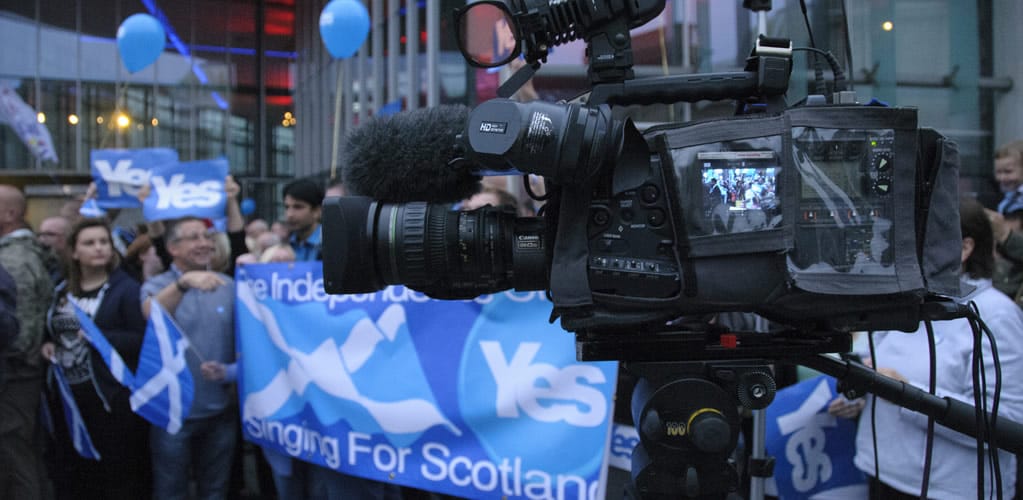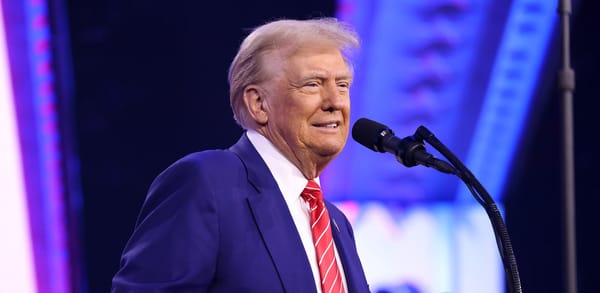Shifting goalposts and the failure of the Scottish media
The Scottish media’s handling of the ongoing constitutional impasse regarding a second independence referendum has come under scrutiny for its perceived one-sidedness and for framing the issue as primarily a matter for the SNP.

The Scottish media’s handling of the ongoing constitutional impasse regarding a second independence referendum has come under scrutiny for its perceived one-sidedness and for framing the issue as primarily a matter for the SNP.
T here’s something striking about the Scottish media’s treatment of the current constitutional impasse blocking the path to a second independence referendum. The Scottish media portrays this as exclusively a problem for the SNP, and no consideration is given to the anti-democratic stance of the British nationalist parties in both blocking any such referendum and in refusing to specify what the democratic path to another independence referendum might actually be, even as they continue to insist, in the face of all apparent evidence, that the United Kingdom really is a voluntary union of nations.
The Scottish media continues to give the Labour and Conservative parties a free pass, and in doing so does a grave disservice to the people of Scotland.
You might have thought that defending the basic principles of democracy within the British state would be important to a Scottish media which is overwhelmingly determined to keep Scotland a part of that state. But no. The Scottish media looks the other way. The Scottish media wants to keep Scotland a part of the United Kingdom without troubling itself about what kind of state the United Kingdom actually is. A principled and truly Unionist Scottish media would protest loudly and vociferously about the lack of a clear democratic pathway to another independence referendum because it would see itself as the defender of Scotland as a nation within the voluntary union of the United Kingdom.
But Scotland does not have a principled and truly Unionist anti-independence media, it has an anti-independence media which has sold its soul to the Anglo-British nationalism which has taken over the Labour and Conservative parties in recent years. This media is now incapable of standing up for the national interests of Scotland because it is more afraid of stoking up support for independence than it fears the destruction of the basic precepts of democracy in Scotland by the parties of aggressive Anglo-British nationalism.
Consider the non-replies given by Keir Starmer whenever he has been asked what the democratic route to another independence referendum might be. It was once widely held in Scotland by both supporters of Scottish independence and opponents that the way for the people of Scotland to express their democratic wish for an independence referendum was to elect a Scottish Parliament in which there was a majority of MSPs in favour of holding a referendum. Former Scottish Conservative leader Ruth Davidson said as much back in 2007 when the minority Scottish Government led by Alex Salmond was pressing for an independence referendum but lacked a majority in Holyrood.
Davidson said:
“You don’t get a referendum for free, you have to earn it. So if the Greens and the SNP and the SSP, or any of the other parties who have declared an interest in independence, get it over the line and can make a coalition, make a majority, get the votes in the [Scottish] Parliament, then they’ll vote through a referendum. That’s what democracy is all about.”
By 2019, however, it was no longer what democracy was all about. Since by then it had become apparent to Davidson and other opponents of independence that it was highly likely that pro-independence parties would indeed command a majority in the Scottish Parliament, then the goalposts were shifted, and Davidson was insisting that only an outright majority for the SNP would suffice in order to create a mandate for an independence referendum.
Following the 2021 Holyrood election campaign, which was dominated by the topic of whether to hold another independence referendum and in which the pro-independence and pro-referendum parties won their largest Holyrood majority since the establishment of the devolved parliament, despite a concerted campaign of British nationalist tactical voting, the goal posts were shifted yet again. Almost no media attention was given to who was organising and funding this campaign. Following the declaration of the results, the votes given to the Scottish Greens were utterly discounted as votes in favour of another referendum by the anti-independence parties. Alex Cole-Hamilton of the Lib Dems went so far as to deny that people who had voted SNP were even voting for another independence referendum at all.
Any mandate the SNP think they have for a second referendum is tainted by the fact that half way through the campaign they pivoted away from independence (because it was hurting them) and instead asked Scotland to choose who they wanted to lead us out of the pandemic. 👇🏻 https://t.co/2bFLPK0wvm
— Alex Cole-Hamilton MSP🔶🇺🇦 (@agcolehamilton) September 1, 2021
There was constant appeal to the “once in a generation” slogan deployed by Alex Salmond during the 2014 independence referendum campaign as though this was a legally binding commitment prohibiting the people of Scotland from ever voting for another independence referendum ever again. Naturally, no such binding nature was ever imputed to the slogans and promises of the Better Together campaign despite, or more likely because these have invariably turned out to be false. British nationalist double standards strike again.
Tory Viceroy General Alister Jack not only rejected any idea that there was a mandate for another referendum because the SNP required the votes of Scottish Green MSPs in order to have a majority in Holyrood, he even suggested that there could only be a mandate if a majority of the total electorate, and not just a majority of those who voted, should be required in order to prove a mandate for another referendum. Many other opponents of independence argued that a majority of votes cast should be required in order to demonstrate a mandate for a referendum, self-servingly conflating the rules of a referendum with the rules of a parliamentary election.
Throughout all this the Scottish media focused almost exclusively on what it portrayed as ‘problems for the SNP’ and then First Minister Nicola Sturgeon. No attention at all was paid to the fact that having fought a parliamentary election campaign on the basis of their opposition to another independence referendum and losing, the anti-independence parties were engaged in rewriting the rules of parliamentary elections in order to prove to their own satisfaction that they hadn’t ‘really’ lost at all. Shamefully, the Scottish media, for the most part, colluded in this election stealing instead of calling it out for what it was.
Then, following the inevitable loss of the Scottish Government’s case before the UK Supreme Court, the Scottish media has displayed shockingly little interest in the fact that a two-decade-long political understanding had been ruled unlawful, effectively ripping up the democratic path to an independence referendum. That same media has continually refused to hold British politicians to account for this, presenting the issue as a problem for the SNP, and not what it really is, the abject failure of British democracy in Scotland.
Of course, we all know why they choose this framing, because presenting the duplicity and goalpost shifting of the British nationalist parties – actions which they can only get away with due to Westminster majorities derived from seats outwith Scotland – as a failure of British democracy in Scotland is in itself a powerful argument for independence, and that’s the very last thing that the Scottish media is going to do.






[Read our Comments Guidelines]